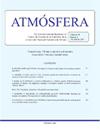El Niño-Southern Oscillation diversity and its relationship with the North Atlantic Oscillation – Atmospheric anomalies response over the North Atlantic and the Pacific
IF 1
4区 地球科学
Q4 METEOROLOGY & ATMOSPHERIC SCIENCES
引用次数: 0
Abstract
To explore the impacts of El Niño-Southern Oscillation (ENSO) on the North Atlantic Oscillation (NAO), the linear correlation among the indices of each oscillation was investigated. The indices Niño 1+2, Niño 3, Niño 3.4, Niño 4, ONI, SOI, BEST, TNI and MEI were used to represent the ENSO, besides the NAO index. The analysis considers the ENSO diversity in its spatial structure. The results show that when years with Eastern Pacific (EP) La Niña events were omitted, the linear correlation increased concerning other scenarios. This means that NAO responses for the Central Pacific (CP) ENSO tend to be linear, but seemingly they are not so for EP ENSO, which explains why the ENSO/NAO relationship has been difficult to identify and predict. The TNI-NAO relationship had the highest correlation values, followed by NAO-El Niño 4, whilst NAO/El Niño 1+2 and NAO/El Niño 3 showed the lowest coefficients. The results also confirmed that the atmospheric dynamics over the North Atlantic have a more linear teleconnection to the West and Central Pacific than to the Eastern Pacific. Changes in deep convection, atmospheric circulation, and vorticity are discussed like possible mechanisms that trigger the changes in impacts over the North Atlantic and other locations. The composite anomalies map also showed the contrast in the effects of both events and the importance of considering those differences when modeling ocean dynamics.El Niño-Southern涛动多样性及其与北大西洋涛动的关系——北大西洋和太平洋的大气异常响应
为了探讨El Niño-Southern涛动(ENSO)对北大西洋涛动(NAO)的影响,研究了各涛动指数之间的线性相关关系。除NAO指数外,还采用Niño 1+2、Niño 3、Niño 3.4、Niño 4指数、ONI、SOI、BEST、TNI和MEI指数代表ENSO。分析考虑了ENSO在空间结构上的多样性。结果表明,当忽略东太平洋La Niña事件年份时,其他情景的线性相关性增加。这意味着NAO对中太平洋ENSO的响应倾向于线性,但对东太平洋ENSO的响应似乎不是线性的,这解释了ENSO/NAO关系难以识别和预测的原因。TNI-NAO关系的相关值最高,其次是NAO-El Niño 4, NAO/El Niño 1+2和NAO/El Niño 3的相关系数最低。结果还证实,北大西洋上空的大气动力学与西太平洋和中太平洋的远相关比与东太平洋的远相关更为线性。深对流、大气环流和涡度的变化被讨论为触发北大西洋和其他地区影响变化的可能机制。复合异常图还显示了这两个事件影响的对比,以及在模拟海洋动力学时考虑这些差异的重要性。
本文章由计算机程序翻译,如有差异,请以英文原文为准。
求助全文
约1分钟内获得全文
求助全文
来源期刊

Atmosfera
地学-气象与大气科学
CiteScore
2.20
自引率
0.00%
发文量
46
审稿时长
6 months
期刊介绍:
ATMÓSFERA seeks contributions on theoretical, basic, empirical and applied research in all the areas of atmospheric sciences, with emphasis on meteorology, climatology, aeronomy, physics, chemistry, and aerobiology. Interdisciplinary contributions are also accepted; especially those related with oceanography, hydrology, climate variability and change, ecology, forestry, glaciology, agriculture, environmental pollution, and other topics related to economy and society as they are affected by atmospheric hazards.
 求助内容:
求助内容: 应助结果提醒方式:
应助结果提醒方式:


